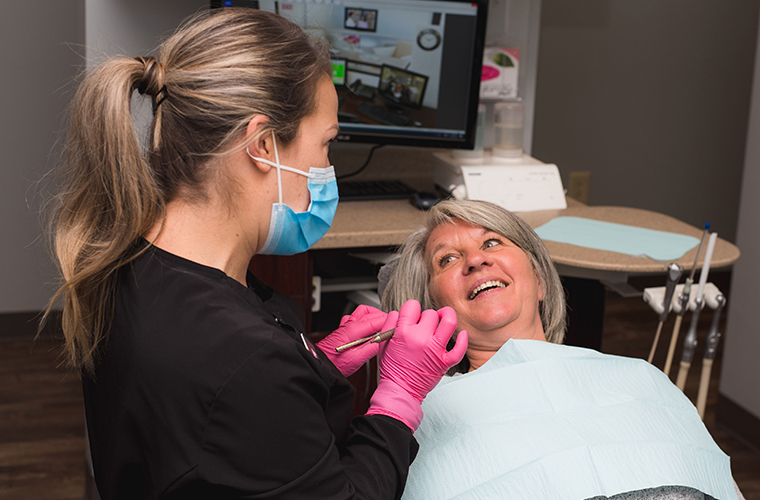Hormones and Oral Health: What Every Woman Should Know?

They are the reason why you WANT & NEED chocolate at certain times. They are the reason why you sometimes cry for “no reason at all.” They are why you have curves and feel like those curves are sometimes squeezed into your jeans. They are why you can have children…and hot flashes!
But did you know they are also the reason that your gums bleed when you brush or floss?
We are talking about hormones, and you might be surprised to learn that they have a significant effect on your oral health.
May is Women’s Health Month, which makes it the perfect time to learn more about the connection between hormones and women’s oral health at different stages of our lives.
What is women’s oral health?
If we consider the definition by the CDC, oral health refers to the health of the teeth, gums, and the entire oral-facial system that allows us to smile, speak, and chew.
Hormones affect everything about women’s health, including oral health. Hormonal changes or imbalances during puberty and our menstrual cycle, pregnancy, and menopause influence biological functions like blood circulation to the mouth or how much saliva the body produces.
These changes can lead to oral health issues like sensitive or bleeding gums, early-stage gum disease, or other oral problems.
Let’s look at women’s unique challenges with hormonal changes at various life stages.
How does my menstrual cycle affect my oral health?
Due to the hormonal changes (particularly the increase in progesterone) that occur during the menstrual cycle, some young women experience oral changes that can include:
- Bright red swollen gums
- Swollen salivary glands
- Development of canker sores
- Bleeding gums (sometimes called Menstruation Gingivitis)
Menstruation Gingivitis usually starts a day or two before your period and clears up shortly after. However, if these symptoms persist, you may need to talk with your dentist because something else may happen.
What should you do?
Maintaining your daily oral health routine is essential; Dr. Mann states, “Removing plaque and bacteria thoroughly daily can reduce the inflammation, discomfort and bleeding.” If your gum sensitivity persists, an over-the-counter topical gel might provide temporary relief.
How does birth control affect oral health?
Women who use birth control pills, or oral contraceptives, should notify our dental team. Maintaining good oral health while taking this medication is crucial.
- Inflamed gum tissue
Women who take certain oral contraceptives that contain progesterone might experience inflamed gum tissue due to the body’s exaggerated reaction to the toxins produced from plaque. The most profound changes in the gums are seen in the first few months after starting birth control pills. Newer birth control pills, however, have lower concentrations of hormones, which lessens the inflammatory response of the gums to dental plaque.
- Temporomandibular (TMJ) disorders
A decrease in natural estrogen due to birth control use has been linked to TMJ disorders. The temporomandibular joint connects your jaw to the side of your head. Temporomandibular disorders result from problems with the jaw, jaw joint, and surrounding muscles that control chewing and moving the jaw.
- Higher dry socket risk
If you’re having a tooth removed, you may be more at risk for a painful complication called dry socket. According to the June 2016 Journal of the American Dental Association study, women who use oral contraceptives are nearly twice as likely to experience dry socket compared to those who do not.
What should you do?
Maintain your daily oral health routine and keep your health history forms updated; one of our associates may need to write you a prescription, and some medications can make your birth control less effective.
How does pregnancy affect oral health?
At first glance, it may not seem like oral health has much to do with pregnancy, but maintaining good oral health is critical as your body is on hormonal hyperdrive. A mother’s oral health can affect the overall health of her baby and has been linked to preterm and low birth weight babies, so it’s important to pay close attention to dental care and any changes that may arise while pregnant.
- Tooth sensitivity and pain: caused by hormonal changes and disruptions in your oral health routine (not wanting to brush your teeth due to morning sickness).
- Some women find they have developed Pregnancy Gingivitis — a mild form of gum disease that causes gums to be red, tender, and sore. It is most common between the second and eighth months of pregnancy. Women with a history of gingivitis are most likely to have Pregnancy Gingivitis.
What should you do?
Tooth sensitivity, pain, and Pregnancy Gingivitis should go away once the baby is born. It is very important during pregnancy to maintain a consistent oral health routine:
- Brush and floss your teeth twice daily with fluoride toothpaste
- Pay special attention to the gum line
- Rinse your mouth after morning sickness and wait at least 30 minutes before brushing
- Eat a well-balanced diet, including foods with vitamin C, which can fight off infections and help reduce swollen gums
- Visit the dentist during pregnancy
In fact, our Smilemann team may recommend more frequent cleanings during your second and early third trimesters to help control gingivitis. If you notice any other changes in your mouth during pregnancy, be sure to inform our team.
How does menopause affect oral health?
Numerous oral changes can occur due to advanced age, the medicines taken to combat diseases, and hormonal changes due to menopause. These oral changes can include altered taste, a burning sensation in the mouth, and greater sensitivity to hot and cold foods and beverages. Still, there are two critical changes to be aware of:
- Dry mouth (xerostomia): Post-menopausal women often experience dry mouth due to decreased saliva production. Saliva helps defend against periodontal (gum) disease and tooth decay as it washes food off teeth, neutralizes acids in the mouth, fights germs, and prevents bad breath.
- The decline in estrogen that occurs with menopause also puts women at greater risk for bone loss or osteoporosis and inflammation of the tissues surrounding the teeth (called periodontitis). Loss of bone, specifically in the jaw, can lead to tooth loss. Receding gums can signal bone loss in the jawbone and expose more of the tooth surface to potential tooth decay.
What should you do?
Of course, the best defense is a consistent home care routine and regular dental visits.
Bonus recommendation from Dr. Charles Ashley Mann
“If dry mouth is a problem, suck on ice chips or sugar-free candy, drink water or other caffeine-free drinks and use an over-the-counter dry mouth spray or rinse to help reduce the dryness. We may also recommend a prescription strength fluoride toothpaste that helps reduce the risk of tooth decay.”
What you eat can also make a difference when it comes to dry mouth.
- Avoid salty, spicy, sticky, and sugary foods and dry foods that are hard to chew.
- Alcohol, tobacco, and caffeine can also make dry mouth worse.
Lastly, try sleeping with a humidifier. Women can prevent the oral health effects of osteoporosis by following nutritious eating habits that include plenty of calcium and vitamin D and discussing proper treatment options with your doctor and dentist.

Conclusion…
Hormones are a fact of life, but they don’t have to interfere with a woman’s ability to maintain a healthy smile at every age and stage of life. Women can maintain their oral health through good oral health habits like brushing, flossing, regularly visiting the dentist, and following a healthy diet. Our Smilemann team is always ready to help you navigate life’s challenges at any stage of life.
Let’s commit to celebrating Women’s Oral Month by taking steps to improve your own oral health or encouraging an important woman in your life to improve her oral health.
Charles Ashley Mann, DDS & Associates, is conveniently located in Cary, Fuquay-Varina, Garner, NC. We happily welcome patients from neighboring communities.



